| Listing 1 - 10 of 19 | << page >> |
Sort by
|
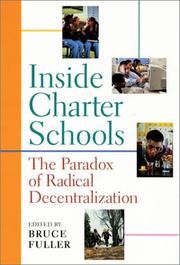
ISBN: 0674037421 9780674037427 067400325X 0674008235 Year: 2000 Publisher: Cambridge, MA : Harvard University Press,
Abstract | Keywords | Export | Availability | Bookmark
 Loading...
Loading...Choose an application
- Reference Manager
- EndNote
- RefWorks (Direct export to RefWorks)
Deepening disaffection with conventional public schools has inspired flight to private schools, home schooling, and new alternatives, such as charter schools. Barely a decade old, the charter school movement has attracted a colorful band of supporters, from presidential candidates, to ethnic activists, to the religious Right. At present there are about 1,700 charter schools, with total enrollment estimated to reach one million early in the century. Yet, until now, little has been known about the inner workings of these small, inventive schools that rely on public money but are largely independent of local school boards. Inside Charter Schools takes readers into six strikingly different schools, from an evangelical home-schooling charter in California to a back-to-basics charter in a black neighborhood in Lansing, Michigan. With a keen eye for human aspirations and dilemmas, the authors provide incisive analysis of the challenges and problems facing this young movement. Do charter schools really spur innovation, or do they simply exacerbate tribal forms of American pluralism? Inside Charter Schools provides shrewd and illuminating studies of the struggles and achievements of these new schools, and offers practical lessons for educators, scholars, policymakers, and parents.
Charter schools --- Schools --- Education and state --- Public institutions --- Education --- Decentralization
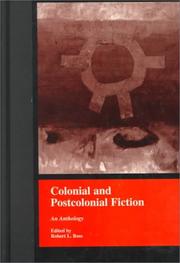
ISBN: 1282778994 9786612778995 1135580049 0203906829 9780203906828 9780815314318 0815314310 9781135580049 0815314310 0815330804 9780815330806 9781135579999 9781135580032 9781138975392 Year: 1999 Publisher: New York Garland Pub.
Abstract | Keywords | Export | Availability | Bookmark
 Loading...
Loading...Choose an application
- Reference Manager
- EndNote
- RefWorks (Direct export to RefWorks)
Transitional societies-struggling to build democratic institutions and new political traditions-are faced with a painful dilemma. How can Government become strong and effective, building a common good that unites disparate ethnic and class groups, while simultaneously nurturing democratic social rules at the grassroots? Professor Fuller brings this issue to light in the contentious, multicultural setting of Southern Africa. Post-apartheid states, like South Africa and Namibia, are pushing hard to raise school quality, reduce family poverty, and equalize gender relations inside villages and
Democracy. --- Government - Asia --- Government - Non-U.S. --- Law, Politics & Government --- Democracy --- Africa, Southern --- Politics and government --- Social policy.
Book
ISBN: 1421442787 9781421442785 9781421442778 1421442779 Year: 2022 Publisher: Baltimore
Abstract | Keywords | Export | Availability | Bookmark
 Loading...
Loading...Choose an application
- Reference Manager
- EndNote
- RefWorks (Direct export to RefWorks)
"The author delves into a promising mystery, challenging critics of public schools in America: Why did student learning climb for two decades in Los Angeles, which has the nation's second-largest public school district? The author discovers a colorful and pluralist politics of the city that sparked a variety of institutional reforms and yielded gains for students and teachers alike"--
Academic achievement --- Education and state --- Public schools --- Educational change
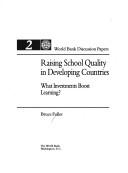
ISBN: 0821308467 Year: 1986 Publisher: Washington (D.C.): World Bank
Abstract | Keywords | Export | Availability | Bookmark
 Loading...
Loading...Choose an application
- Reference Manager
- EndNote
- RefWorks (Direct export to RefWorks)
Education --- Aims and objectives --- Finance
Book
ISBN: 0415902274 Year: 1991 Publisher: New York London Routledge
Abstract | Keywords | Export | Availability | Bookmark
 Loading...
Loading...Choose an application
- Reference Manager
- EndNote
- RefWorks (Direct export to RefWorks)
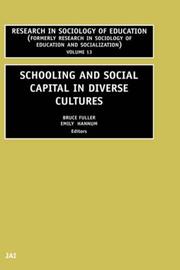
ISBN: 0762308176 1849508852 Year: 2006 Publisher: Amsterdam JAI
Abstract | Keywords | Export | Availability | Bookmark
 Loading...
Loading...Choose an application
- Reference Manager
- EndNote
- RefWorks (Direct export to RefWorks)
One of the most seductive topics in recent years is the field of social capital - the webs of trust, mutual obligation, and cultural knowledge that flow through local information - that yield resources in human-scale associations of individuals. When we ask about the implications for children's learning and performance in the school institution, however, the construct quickly becomes slippery to hold. The 2001 volume provides five papers that offer empirical evidence on the nature and life of social capital across diverse ethnic groups and cultural settings. These fresh studies delve into the resources embedded in Latino and Asian-American peer groups, how immigrant parents' networks and norms variably push their children to achieve in school, and how teenagers' involvement in ethnic-rooted churches contribute social capital. The volume includes three commentaries, authored by David Baker, Patricia Fernandez-Kelly, and Raymond Wong, and a review chapter by the editors.
#SBIB:316.334.1O340 --- Onderwijs en sociale verandering, onderwijs en samenleving --- Educational sociology --- Social capital (Sociology). --- Social capital (Sociology) --- Capital, Social (Sociology) --- Sociology --- Education and sociology --- Social problems in education --- Society and education --- Sociology, Educational --- Education --- Aims and objectives
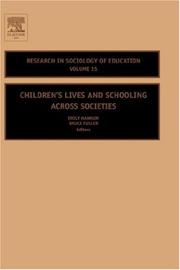
ISBN: 9781849504003 1849504008 0762312912 9786610636259 1280636254 0080463398 9780080463476 0080463479 9780080463391 9780762312917 9781280636257 6610636257 Year: 2009 Publisher: Bingley Emerald Group Publishing Limited
Abstract | Keywords | Export | Availability | Bookmark
 Loading...
Loading...Choose an application
- Reference Manager
- EndNote
- RefWorks (Direct export to RefWorks)
In recent decades, sociological research has investigated the nature of the school institution and its uneven effects on the progress of families, societies, and the global community. Yet, relatively little comparative research on schooling has dealt in a serious way with links between schooling and the other major contexts of childhood: families and communities. This edition of "Research in the Sociology of Education" speaks to the diverse contexts in which children function around the world, and to how these contexts shape school experiences and outcomes. The edition's authors are international and interdisciplinary. They offer a pastiche of perspectives on a single topic: how the non-school contexts of childhood interact with the school institution to advance modern and not-so-modern forms of virtue, merit, and attainment, in cultural context. This book offers qualitative and statistical portraits of children living in Asian and African countries. It links educational opportunities to the child's socialization. It urges social scientists and policy makers to consider a child's surroundings when modeling the modern school system. This book series is available electronically online.
Educational sociology. --- Sociology. --- Social theory --- Social sciences --- Education and sociology --- Social problems in education --- Society and education --- Sociology, Educational --- Sociology --- Education --- Aims and objectives --- Education. --- Age groups: children. --- Social Science --- General.
Book
ISBN: 027593831X Year: 1992 Publisher: New York (N.Y.) : Praeger,
Abstract | Keywords | Export | Availability | Bookmark
 Loading...
Loading...Choose an application
- Reference Manager
- EndNote
- RefWorks (Direct export to RefWorks)
Education and state --- Education --- Economic aspects --- Political aspects --- Education and state. --- Historische en vergelijkende pedagogiek. --- Economic aspects. --- Political aspects.
Book
ISBN: 0821319329 Year: 1992 Publisher: Washington (D.C.) World Bank
Abstract | Keywords | Export | Availability | Bookmark
 Loading...
Loading...Choose an application
- Reference Manager
- EndNote
- RefWorks (Direct export to RefWorks)
Educational change --- Education and state --- Education --- Congresses --- Finance
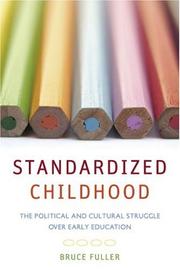
ISBN: 0804763283 1435608992 9781435608993 9780804755795 0804755795 9780804763288 Year: 2007 Publisher: Stanford Stanford University Press
Abstract | Keywords | Export | Availability | Bookmark
 Loading...
Loading...Choose an application
- Reference Manager
- EndNote
- RefWorks (Direct export to RefWorks)
A array of childcare and preschool options blossomed in the 1970s as the feminist movement spurred mothers into careers and community organizations nurtured new programs. Now a small circle of activists aims to bring more order to childhood, seeking to create a more standard, state-run preschool system. For young children already facing the rigors of play dates and harried parents juggling the strains of work and family, government is moving in to standardize childhood. Sociologist Bruce Fuller traveled the country to understand the ideologies of childhood and the raw political forces at play. He details how progressives earnestly seek to extend the rigors of public schooling down into the lives of very young children. Fuller then illuminates the stiff resistance from those who hold less trust in government solutions and more faith in nonprofits and local groups in contributing to the upbringing of young children. The call for universal preschool is a new front in the culture wars, raising sharp questions about American families, cultural diversity, and the appropriate role of the state in the lives of our young children. Standardized Childhood shows why the universal preschool movement is attracting such robust support—and strident opposition—nationwide.
Education, Preschool --- Early childhood education --- Education [Preschool ] --- United States
| Listing 1 - 10 of 19 | << page >> |
Sort by
|

 Search
Search Feedback
Feedback About UniCat
About UniCat  Help
Help News
News